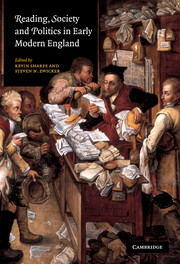Book contents
- Frontmatter
- Contents
- List of illustrations
- List of contributors
- Acknowledgements
- Introduction: discovering the Renaissance reader
- Part I THE MATERIAL TEXT
- Part 2 READING AS POLITICS
- Part 3 PRINT, POLITICS AND PERFORMANCE
- Part 4 READING PHYSIOLOGIES
- Part 5 READING IN THE TIME
- 9 Martial, Jonson and the assertion of plagiarism
- 10 The constitution of opinion and the pacification of reading
- 11 Cato's retreat: fabula, historia and the question of constitutionalism in Mr Locke's anonymous Essay on Government
- Index
9 - Martial, Jonson and the assertion of plagiarism
Published online by Cambridge University Press: 22 September 2009
- Frontmatter
- Contents
- List of illustrations
- List of contributors
- Acknowledgements
- Introduction: discovering the Renaissance reader
- Part I THE MATERIAL TEXT
- Part 2 READING AS POLITICS
- Part 3 PRINT, POLITICS AND PERFORMANCE
- Part 4 READING PHYSIOLOGIES
- Part 5 READING IN THE TIME
- 9 Martial, Jonson and the assertion of plagiarism
- 10 The constitution of opinion and the pacification of reading
- 11 Cato's retreat: fabula, historia and the question of constitutionalism in Mr Locke's anonymous Essay on Government
- Index
Summary
I have only a mildly surprising fact of cultural history to report here, that Martial seems to be the single most important influence on Ben Jonson's thinking about intellectual property in particular, and about the material culture of early modern books in general. I unearthed this datum during work on a central chapter of a study of the institutions of intellectual property in early modern England. My goal had been to specify the hard, material determinants of authors' imaginings of what they were making, but I couldn't escape the fact that Jonson's imagination of books was influenced not only by the manifold instances of English monopolistic competition, but also by a vivid and idiosyncratic first-century collection of poetry.
Such an observation is obviously encouraged by long-standing traditions of analysing influence, traditions central to the study of the history of writing, yet the editors of this volume have insisted that their contributors get over to the reader's side of things for this occasion. As a practising literary critic, I might find it slightly disingenuous, if not exactly perverse, to offer a short essay treating Jonson simply as a reader of Martial, or as a simple reader of Martial – that is, not as someone who reads in order, especially, to write but as someone who reads in order, say, to make private sense of Martial, or perhaps to staple this feature of the classical text to that feature of the Jacobean world – though this has been done effectively with a less gifted writer such as Gabriel Harvey.
- Type
- Chapter
- Information
- Reading, Society and Politics in Early Modern England , pp. 275 - 294Publisher: Cambridge University PressPrint publication year: 2003



